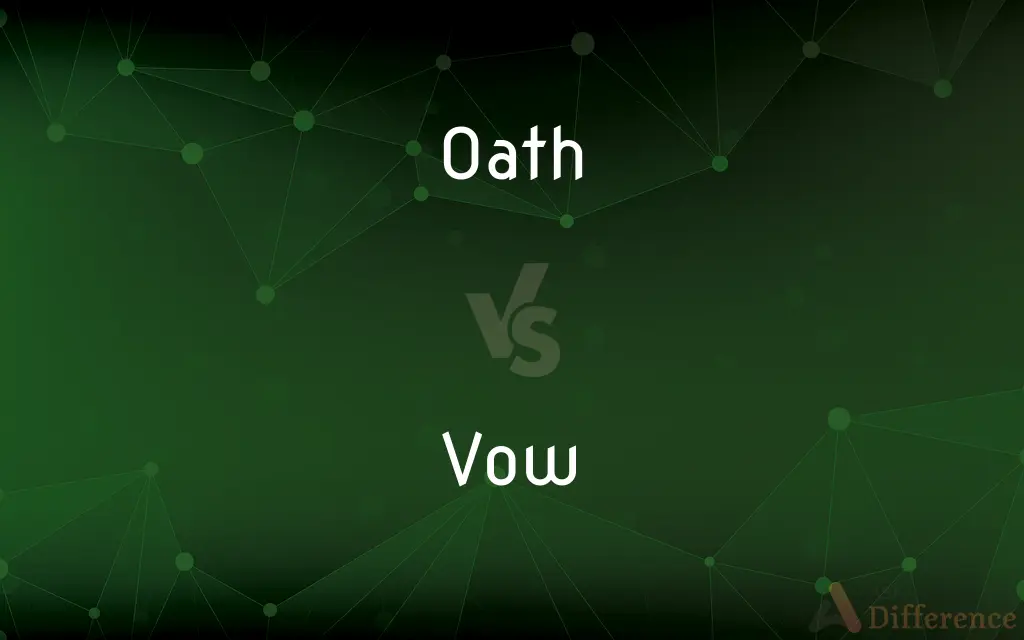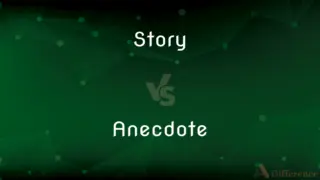Oath vs. Vow — What's the Difference?
Edited by Tayyaba Rehman — By Fiza Rafique — Updated on October 31, 2023
An oath is a solemn promise, often invoking a divine witness, regarding one's future action or behavior. A vow is a solemn promise or pledge, typically personal and often made to a deity, concerning a future act or behavior.

Difference Between Oath and Vow
Table of Contents
ADVERTISEMENT
Key Differences
An oath is a formal, solemn promise often used in legal or ceremonial contexts and may involve invoking a divine or higher power as a witness. A vow, while also a serious promise, is more personal and often connected to individual commitments or religious contexts.
Oaths often carry legal implications, such as those taken by public officials or witnesses in court. Vows, however, are usually personal pledges without legal enforceability, often made in religious or spiritual contexts.
Oaths are typically associated with duties, responsibilities, or roles, such as the Hippocratic Oath taken by doctors. Vows are more associated with personal commitments or resolutions, like marriage vows or religious vows of celibacy.
Oaths have a long history in legal and state affairs, symbolizing integrity and truthfulness. Vows are deeply rooted in religious and cultural traditions, symbolizing personal dedication and devotion.
While both are considered binding, oaths tend to be more rigid due to their legal or official nature. Vows, though serious, are often more flexible and adaptable to personal beliefs and circumstances.
ADVERTISEMENT
Comparison Chart
Formality
Formal and often public.
Personal and sometimes private.
Legal Implications
May have legal weight.
Usually no legal implications.
Nature of Commitment
Related to duties or roles.
Personal commitments or resolutions.
Cultural Usage
Used in legal, official, and ceremonial roles.
Common in religious or spiritual practices.
Flexibility
Generally rigid due to its nature.
More flexible, tailored to personal beliefs.
Compare with Definitions
Oath
A formal pledge used in official or legal contexts.
The president took the oath of office.
Vow
A serious and heartfelt declaration.
He vowed to return and fulfill his promise.
Oath
A vow or promise made with serious intent.
The doctor adhered to the Hippocratic Oath.
Vow
A solemn promise, especially one made to a deity.
She made a vow to live a life of kindness.
Oath
A binding promise with serious implications.
Soldiers take an oath to defend their country.
Vow
A promise often related to moral or religious dedication.
The monk took a vow of silence.
Oath
A solemn promise, often invoking a deity or sacred thing.
He took an oath to uphold the law.
Vow
A pledge of personal intent or resolution.
She took a vow to pursue her dreams.
Oath
Traditionally an oath (from Anglo-Saxon āð, also called plight) is either a statement of fact or a promise with wording relating to something considered sacred as a sign of verity. A common legal substitute for those who conscientiously object to making sacred oaths is to give an affirmation instead.
Vow
A vow (Lat. votum, vow, promise; see vote) is a promise or oath.
Oath
A solemn promise, often invoking a divine witness, regarding one's future action or behaviour
They took an oath of allegiance to the king
Vow
An earnest promise to perform a specified act or behave in a certain manner, especially a solemn promise to live and act in accordance with the rules of a religious order
Take the vows of a nun.
Oath
A profane or offensive expression used to express anger or other strong emotions
He exploded with a mouthful of oaths
He was muttering foul oaths
Vow
To promise solemnly; pledge.
Oath
A solemn, formal declaration or promise to fulfill a pledge, often calling on God, a god, or a sacred object as witness.
Vow
To make a pledge or threat to undertake
Vowing revenge on their persecutors.
Oath
The words or formula of such a declaration or promise.
Vow
To make a vow; promise.
Oath
Something declared or promised.
Vow
To declare or assert
"Well, I vow it is as fine a boy as ever was seen!" (Henry Fielding).
Oath
An irreverent or blasphemous use of the name of God or something held sacred.
Vow
A solemn promise to perform some act, or behave in a specified manner, especially a promise to live and act in accordance with the rules of a religious order.
The old hermit, up in the mountains, took a vow of silence.
Oath
An imprecation; a curse.
Vow
A declaration or assertion.
Oath
A solemn pledge or promise that invokes a deity, a ruler, or another entity (not necessarily present) to attest the truth of a statement or sincerity of one's desire to fulfill a contract or promise.
Take an oath
Swear an oath
Break one's oath
Vow
(obsolete) A votive offering.
Oath
A statement or promise which is strengthened (affirmed) by such a pledge.
After taking the oath of office, she became the country's forty-third premier.
The generals swore an oath of loyalty to the country.
Vow
(ambitransitive) To make a vow; to promise.
Oath
A light, irreverent or insulting appeal to a deity or other entity.
Vow
(transitive) To make a vow regarding (something).
The wronged woman vowed revenge.
Oath
A curse, a curse word.
Vow
To declare publicly that one has made a vow, usually to show one's determination or to announce an act of retaliation.
The rebels vowed to continue their fight.
Oath
(archaic) To pledge.
Vow
A solemn promise made to God, or to some deity; an act by which one consecrates or devotes himself, absolutely or conditionally, wholly or in part, for a longer or shorter time, to some act, service, or condition; a devotion of one's possessions; as, a baptismal vow; a vow of poverty.
I pray thee, let me go and pay my vow.
I am combined by a sacred vow.
Oath
A solemn affirmation or declaration, made with a reverent appeal to God for the truth of what is affirmed.
An oath of secrecy for the concealing of those [inventions] which we think fit to keep secret.
Vow
Specifically, a promise of fidelity; a pledge of love or affection; as, the marriage vow.
Knights of love, who never broke their vow;Firm to their plighted faith.
Oath
A solemn affirmation, connected with a sacred object, or one regarded as sacred, as the temple, the altar, the blood of Abel, the Bible, the Koran, etc.
Vow
To give, consecrate, or dedicate to God, or to some deity, by a solemn promise; to devote; to promise solemnly.
[Men] that vow a long and weary pilgrimage.
Oath
An appeal (in verification of a statement made) to a superior sanction, in such a form as exposes the party making the appeal to an indictment for perjury if the statement be false.
Vow
To assert solemnly; to asseverate.
Oath
A careless and blasphemous use of the name of the divine Being, or anything divine or sacred, by way of appeal or as a profane exclamation or ejaculation; an expression of profane swearing.
Vow
To make a vow, or solemn promise.
Better is it that thou shouldest not vow, than that thou shouldest vow and not pay.
Oath
Profane or obscene expression usually of surprise or anger;
Expletives were deleted
Vow
A solemn pledge (to oneself or to another or to a deity) to do something or to behave in a certain manner;
They took vows of poverty
Oath
A commitment to tell the truth (especially in a court of law); to lie under oath is to become subject to prosecution for perjury
Vow
Make a vow; promise;
He vowed never to drink alcohol again
Oath
A solemn promise, usually invoking a divine witness, regarding your future acts or behavior;
They took an oath of allegience
Vow
Dedicate to a deity by a vow
Oath
A sworn declaration, affirming truthfulness.
Witnesses give an oath before testifying in court.
Vow
A personal pledge or commitment.
They exchanged marriage vows at the ceremony.
Common Curiosities
Can a vow be legally binding?
Generally, vows are not legally binding; they are personal pledges without legal enforceability.
What makes an oath formal?
An oath is formal due to its use in legal, official, or ceremonial contexts and often involves invoking a higher power.
Can a vow be made to oneself?
Yes, vows can be personal resolutions or pledges made to oneself.
Do oaths have to be spoken aloud?
Oaths are typically spoken aloud, especially in formal settings, to affirm commitment and truthfulness.
Are oaths legally enforceable?
Some oaths, like those in legal contexts, can have legal implications and be enforceable.
Can vows be changed or broken?
While serious, vows are personal and can be adapted or broken, depending on individual circumstances and beliefs.
Are all oaths religious?
Not all oaths are religious; many are secular, especially in legal or official settings.
Are vows always religious?
While often associated with religion, vows can also be secular personal commitments.
Is a marriage vow an oath?
Marriage vows are considered vows, not oaths, as they are personal pledges made between individuals.
Are oaths always public?
Oaths are often public, especially in official or ceremonial contexts, but can also be private.
Can an oath be withdrawn?
In some cases, oaths can be withdrawn or nullified, especially if the conditions change.
Do vows require witnesses?
Vows do not necessarily require witnesses; they can be deeply personal and private.
Do all cultures use oaths?
Most cultures have some form of oath, though the specifics and contexts may vary.
Is breaking an oath a legal offense?
In some contexts, like perjury in court, breaking an oath can be a legal offense.
Can vows be made for a limited time?
Yes, vows can be time-bound or lifelong, depending on the nature of the pledge.
Share Your Discovery

Previous Comparison
Tutee vs. Tutor
Next Comparison
Story vs. AnecdoteAuthor Spotlight
Written by
Fiza RafiqueFiza Rafique is a skilled content writer at AskDifference.com, where she meticulously refines and enhances written pieces. Drawing from her vast editorial expertise, Fiza ensures clarity, accuracy, and precision in every article. Passionate about language, she continually seeks to elevate the quality of content for readers worldwide.
Edited by
Tayyaba RehmanTayyaba Rehman is a distinguished writer, currently serving as a primary contributor to askdifference.com. As a researcher in semantics and etymology, Tayyaba's passion for the complexity of languages and their distinctions has found a perfect home on the platform. Tayyaba delves into the intricacies of language, distinguishing between commonly confused words and phrases, thereby providing clarity for readers worldwide.
















































